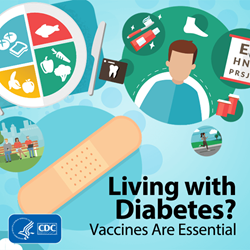The Link Between Diabetes and Heart Disease: 5 Ways to Address It During American Heart Month
Feb 10, 2020, 14:39 PM
Heart disease remains the leading cause of death in the U.S., but diabetes care and education specialists should pay special attention to the risk of heart disease in people with diabetes because of the link between the two disease states. People with diabetes (PWDs) are more likely to have conditions that are risk factors for heart disease, such as high blood pressure or high cholesterol. In fact, PWDs are twice as likely to have a heart attack or a stroke as people without diabetes. Among people with diabetes over age 65, approximately 68% die from heart disease and 15% die from stroke.1
As you address cardiovascular health, it’s important to let your clients know that they can protect their heart and health by managing their blood glucose, blood pressure and cholesterol. Take advantage of the fact that February is American Heart Month and start a “heart health” conversation.
People with diabetes are twice as likely to have a heart attack or a stroke as people without diabetes.
Here are 5 steps you can take to address heart disease in your clients with diabetes this month:
- Encourage them to use the ASCVD Risk Estimator to calculate their chance of developing heart disease or having a heart attack or stroke in the next 10 years. Helping them understand and identify their risks allows them to identify steps to reduce that risk.
- Use the AADE7 Self-Care Behaviors™ to develop strategies that minimize or prevent the risk for heart disease. Use the ASCVD Risk Estimator tool in tandem with this step to forecast the potential impact of different interventions on their risk for heart disease.
- Incorporate goals for blood pressure, cholesterol, physical activity and weight in addition to glucose management. By helping your clients understand the recommended ranges set by the American Diabetes Association, you empower them to engage in treatment decisions with their provider.

- Print this ADCES resource with the top five questions your client should ask their healthcare provider. Encourage your client to continue the conversation of preventing or managing heart disease with other members of their care team to assure they are supported at various points of care.
- Promote vaccines with your clients. Complications from some vaccine-preventable diseases can include increased risk of heart attack, hospitalization, or even death. The CDC reports that people with diabetes or heart disease and people who have had a stroke have an increased risk of developing serious complications from flu or having a serious flu outcome like a stay in the hospital or even being admitted to the intensive care unit.2,3 And a 2018 study found the risk of heart attack was 6 times higher within a week of confirmed flu infection.3
Continue to explore the link between diabetes and heart disease by accessing on-demand webinars, journal articles and printable tip sheets on our updated page for Heart Disease and Diabetes at DiabetesEducator.org/CVD.
ADCES Perspectives on Diabetes Care
The Association of Diabetes Care & Education Specialists Perspectives on Diabetes Care covers diabetes, prediabetes and other cardiometabolic conditions. Not all views expressed reflect the official position of the Association of Diabetes Care & Education Specialists.
Copyright is owned or held by the Association of Diabetes Care & Education Specialists and all rights are reserved. Permission is granted, at no cost and without need for further request, to link to, quote, excerpt or reprint from these stories in any medium as long as no text is altered, and proper attribution is made to the Association of Diabetes Care & Education Specialists.
HEALTHCARE DISCLAIMER: This site and its services do not constitute the practice of medical advice, diagnosis or treatment. Always talk to your diabetes care and education specialist or healthcare provider for diagnosis and treatment, including your specific medical needs. If you have or suspect that you have a medical problem or condition, please contact a qualified health care professional immediately. To find a diabetes care and education specialist near you, visit DiabetesEducator.org/Find.